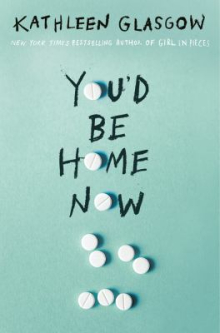
You’d Be Home Now is one of the best portrayals of the young adult experience that I have read to date. The novel follows Emory, a by all means average teenage girl, after a tragic accident leaves her isolated from the majority of her peers. Meanwhile, her brother Joey has been sent to a rehabilitation facility to treat his drug addiction, and Emory grapples with her anxiety surrounding his return. Despite all of her worries, she remains optimistic that her brother will return as the warm and supportive version of himself she remembers from childhood. However, upon Joey’s return home, her family dynamic and situation at school become increasingly strained as Emory does her best to hold everything together.
Kathleen Glasgow’s depiction of Emory’s grief, anxiety, and insecurity is executed almost perfectly. Glasgow avoids using overly flowery language and pretentious metaphors. Instead, she leans towards simpler vocabulary and syntax linked together by just enough vulnerability to create an authentic, intricate story. Every single character is complex in a way that is almost painfully realistic. Emory, Joey, their parents, and even the more minor characters in the book make questionable decisions at almost every turn. As a reader, I neither love nor hate any of these characters; I simply feel as if they are real, flawed individuals whose choices are not exactly redeemable but understandable.
The highlight of this book, for me personally, is the familial relationships. Emory describes an almost tangible distance growing between her and virtually every member of her family, and yet, none of these dynamics are exactly the same. With her brother Joey for instance, Emory is trying desperately to regain the closeness they had together as children. Whereas with her parents, Emory has grown accustomed to their detachment but still longs for them to show a greater interest in her and her siblings.
You’d Be Home Now is a gut-wrenching, emotional, and hopeful novel that explores the pain of being overlooked. I will say that this book has its fair share of triggering topics—including drug addiction and death - that would make it unsuitable for younger readers. All in all, I would definitely rate it a 5 out of 5 stars.
Review by: Kristine S, 12th Grade
—Amanda Charles, Young Adult Librarian, Central Library, Teen'Scape